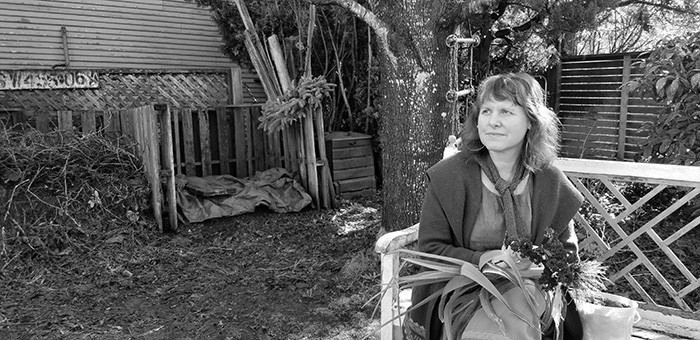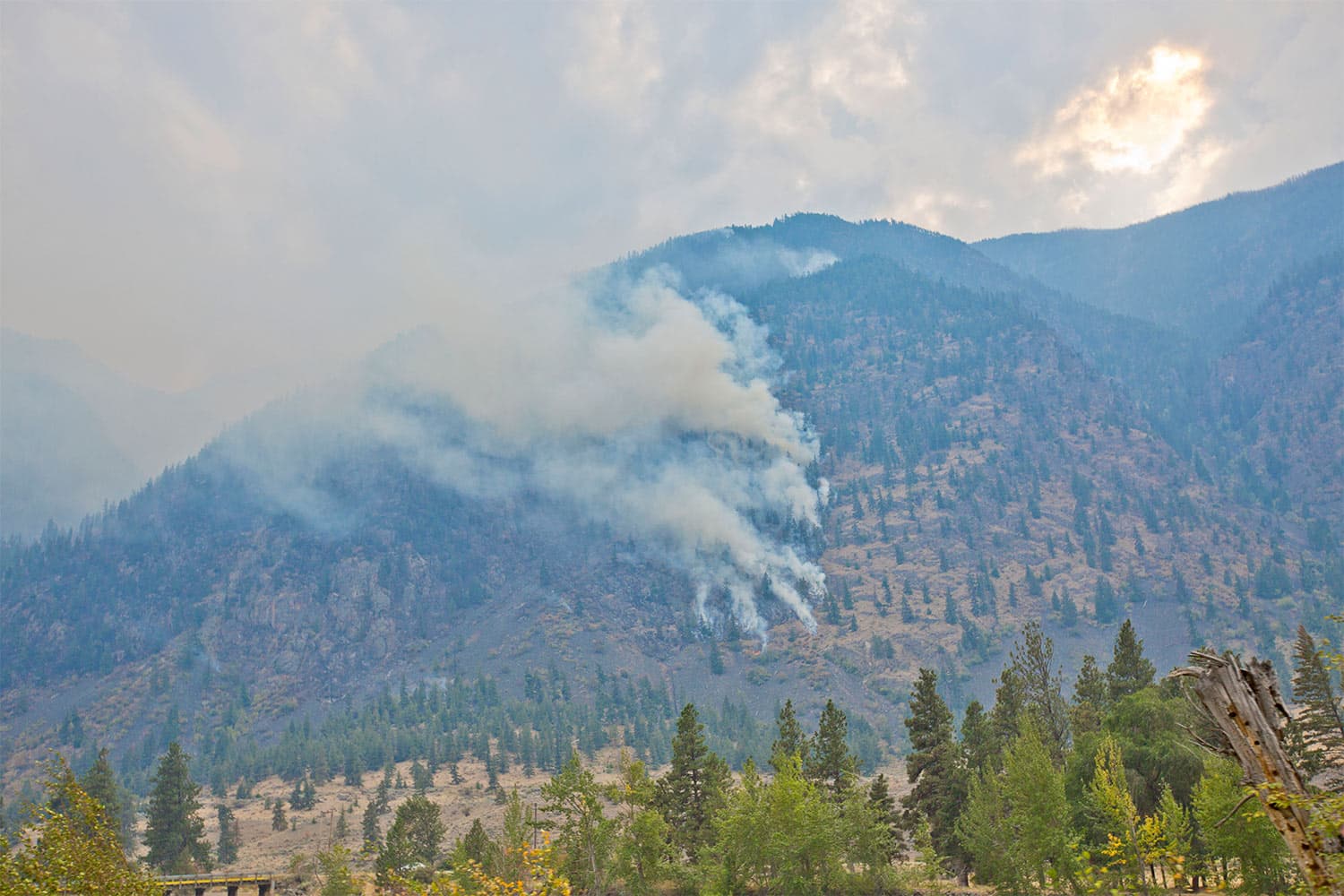Fighting the Cycle of Environmental Abuse
A former boxing-gym owner takes on climate denial.
For summer after summer, wildfires like this one from 2018 have forced residents of interior BC communities—including the one where Sandy Ibrahim’s mother lives—to evacuate their homes.
Sandy Ibrahim, 54, is a writer, student, activist, and mother living in Victoria, BC. She immigrated to Canada from Germany as a baby, and was raised on an acreage outside of Edmonton, AB. Her father owned a compounding pharmacy and worked long hours as a pharmacist while her mother ran the back end of the business. Sandy grew up wanting to be Elvis Presley and to live out in the country with many animals. At seventeen, Sandy left home.
During a four-year stint in Seattle, she learned to box competitively. She loved the therapeutic side of the sport. When she moved to Victoria with her psychiatrist husband and two kids, they showed up in the city with a “’69 VW van that honked whenever we turned left.”
She opened a boxing gym called Capital City Boxing and ran it for six years. She also sent their two boys to a private school in Victoria. Wearing their tie dye T-shirts, they were “very atypical of that community, right off the bat.” Still, her life eventually ended up “being spent going to basketball games and planning European vacations.”

Sandy’s writing career began when she published an article called “Mother Earth’s ‘Me Too’” which asked “middle-class” women to recognize their role in causing climate change. She is working on a book project which examines how to raise children in the age of the Anthropocene. This first-person narrative was shared as part of the Climate Disaster Project. Details about the project follow this story.
I grew up in the country on 3 acres of land in a new subdivision outside of Edmonton. We had a big pond in the backyard. In the winter time, one of the neighbours would take all the snow off so we could skate. My dad would come home and he’d be angry or pissed off, or there’d be fighting in the house, and I would just leave.
As I got older, nature became the backdrop. It was decoration. Something to support our fabulous lives.
So I grew up skating on this pond and there were muskrats underneath my feet, tapping on my skates. There was a family of deer that we got to know. I carved out a little path in the woods. I just could feel this connection between the worms, and the trees, and the wind, and the muskrats, and the birds, and how it was all one system. Because there was just this “blah, blah, blah” going on as soon as I’d enter the house.
As I got older, nature sort of went into the background more and more, until it kind of became the backdrop for my own story. It was decoration. Something to support our fabulous lives. I even raised my children that way unintentionally. I didn’t raise them to view nature as sacred, even though I felt it in my heart.
I think it was 2017. And my eldest had just left. I was missing him. It was the middle of the night, and I wasn’t sleeping, and I decided to listen to this podcast. This woman was bawling her eyes out on this podcast, talking about the destruction of the world. It unleashed something in me.
People had been talking about it from a really distant perspective, like, “Oh, you know, this is happening and you know, look at these charts and these graphs.” Suddenly there was a woman in my ear who was on her knees just collapsing in despair about what was happening to the world. And I recognized myself in that despair. Because I think I had this blind hope that somebody somewhere was going to address this, and somebody somewhere was going to solve it. When that illusion fell away, I lost hope.
I’m sad for my kids, but I’m sad for this world, right? The tears that I have are for them. I just live with this disappointment that humans are so shitty, you know? That we can’t stop. We have all these opportunities to do better. And we don’t. My generation could have stopped this. We could have, we should have. We didn’t do better. And we have to live with that.
My mother could end up being a climate migrant, even though she wouldn’t use those words.
My mother lives in the Interior [of BC]. Basically, for the last three years, there’s been evacuation orders somewhere within her community, maybe within 20 miles or something. You can’t get house insurance in some of these fire zones. And if you can’t get house insurance, well, then, you can’t sell your house.
Last summer she put all of the photographs into her trunk. And I think that’s where all of the photographs lived. So she was sort of prepared to evacuate if she needed to, but she wasn’t very worried about it. She could end up being a climate migrant, even though she wouldn’t use those words. A climate migrant while still in denial about it. It feels like there’s something important that she’ll lose if she connects that this is climate change. Maybe a real sense of security or her optimism or whatever.
My kids aren’t (overly) planning for their future, either. They’re saying, “We’ll see in ten years whether or not I’m going to have kids.” They’re in denial to a lesser or greater degree. I think my eldest understands that collapse is going to happen. At some point he said, “The only way that I can connect with you is if we talk about climate change. And I just want to play a board game, or I just want to do this, or…” He said that he was going to be happy while things were good.
So a lot of it is just trying to have some compassion for myself and everyone who’s alive at this time. That we’ve inherited this thing, this situation. You can’t help the skin or the time that you were born in.
I just felt really ashamed for a long time. But that didn’t help move things along.
I’m still the same person, right? I could go sideways any day; I still want to go shopping. After this winter, I was just like, “Fuck, I want to go to Mexico so bad right now.” I know that these things are still available to me. I guess I look at myself almost like an addict to Western culture and to fossil fuels. It’s going to be day by day. It’s just like the cycle of abuse, right? In my family, for instance, I just made the decision not to continue.
What I can do is very small and very local. I just felt really ashamed for a long time. But that didn’t help move things along. We have the block over for potlucks and we do a little bit of disaster planning inside that event in a fairly nonchalant way. I keep tabs on who has the resources and who needs the resources in our community. And I can just try and weave myself into my tiny little ecosystem on my plot of land. I can work on reparation.
This story was created as part of the Climate Disaster Project. Based at the University of Victoria and led by faculty at 12 other post-secondary institutions, the project includes a virtual international class where journalism, social work, and writing students work with people who have lived through climate disasters to share those stories.
Before the students undertake that work, they share their own stories with one another. And now some of those stories are being shared with you, Asparagus readers. It’s the beginning of a decades-long project to create the world’s largest memory vault of climate experiences, where we will follow a perennial pattern of sharing stories, and finding the problems and solutions in them. Because stories create community, and community creates hope. Visit our Climate Disaster Project page to read more student narratives.
